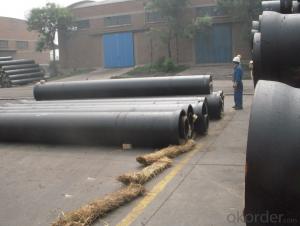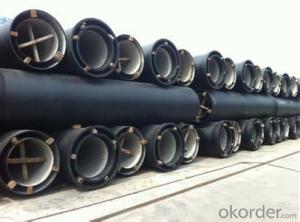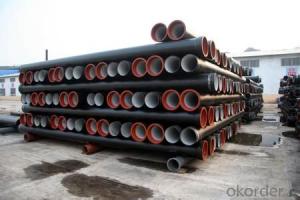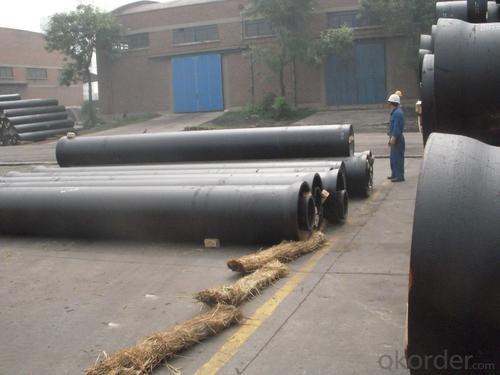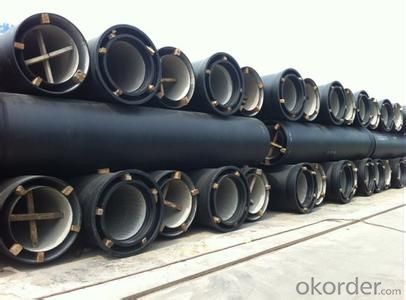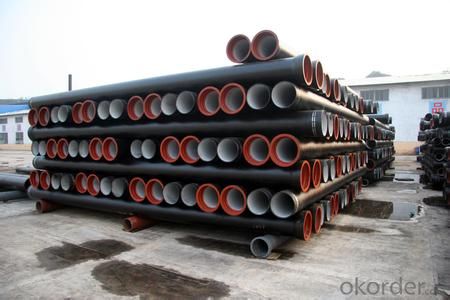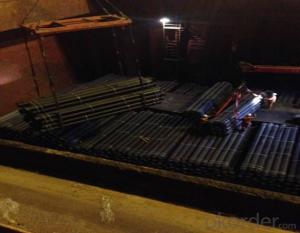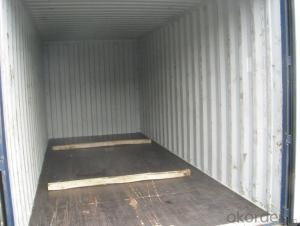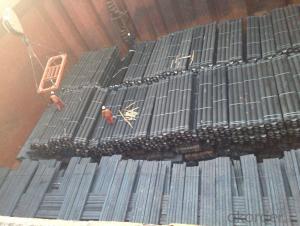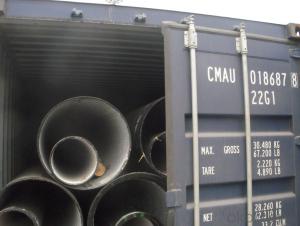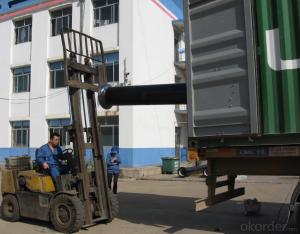DUCTILE IRON PIPES K8 DN1000
- Loading Port:
- China Main Port
- Payment Terms:
- TT OR LC
- Min Order Qty:
- -
- Supply Capability:
- -
OKorder Service Pledge
OKorder Financial Service
You Might Also Like
Ductile Iron Cast Pipe is without any defects compare with tradition casting tech, which has many advantages particularly as follow:
(1) High density. In the "vertical upward casting" process, the melt iron of centre liquid column in center crystallizer is continuously feeding for volume shrinkage caused by condensation tube at outer circumference , which lead to be free of shrinkage porosity.
(2) High purity. When melt iron pouring, the mixed impurities such as gas, dross, sand grain which are lighter than melt iron could be eliminated at furnace mouth, its impossible to enter into the crystallizer through the channel, so the melt iron into the crystallizer is very pure.
(3) Strength with toughness. The cooling speed provided by continuous crystallizer is 30 times than sand casting and 5 times than centrifugal casting, and doesn't produce white iron, the eutectic cell volume of continuous cast iron is one eighth to one tenth compare with traditional cast iron. The density of graphite nodule in ductile iron can reach 300-700 pcs/mm2. Therefore, all reason above improve the strength and toughness of continuous cast iron.
(4) Free machining. The high speed cooling make the hardening phase (such as boride, steadite) not appear like reticular, massive or thick, but diffuse like fish bone and pane in shape, moreover, there are tiny graphite flakes inlaid hardening phase. It's free machining in BrinellHardness the range of 250-300HB. However, the Brinell Hardness of 250 is top limit to common metal materials.
(5) Uniform composition of tube wall. The convection mixing of liquid column caused by marching type drawing in crystallizer make the composition of tube wall well-distributed, and concentration gradient very little.
(6) High productivity. To the wall thickness of tube under 10mm, the speed of continuous casting is 1 meter/min, to the wall thickness of tube under 20mm, the speed of continuous casting is 0.5 meter/min, which is high efficiency that centrifugal or other casting tech couldn't reach.
- Q: How are ductile iron pipes protected against mechanical damage?
- Various measures are implemented to protect ductile iron pipes from mechanical damage, ensuring their durability and longevity. One effective approach involves applying a protective coating to the exterior surface of the pipes. This coating acts as a barrier, safeguarding the ductile iron from physical abrasion, impact, and corrosion. Depending on specific requirements and environmental conditions, the coating can be composed of materials such as epoxy, polyethylene, or zinc. In addition to the protective coating, ductile iron pipes are designed with a high level of structural strength. They are manufactured to withstand significant pressure and external forces, making them less vulnerable to mechanical damage. The inherent strength of the material enables the pipes to resist deformation and cracking, even when subjected to heavy loads or ground movements. Moreover, proper bedding and backfilling techniques are employed during the installation of ductile iron pipes. This involves carefully placing the pipes in a prepared trench to ensure a stable foundation and minimize the risk of external forces causing damage. The correct backfill material is then used to provide support and prevent excessive pressure on the pipes. To further enhance protection against mechanical damage, additional measures such as concrete encasement or protective sleeves are often employed during the installation of ductile iron pipes. Concrete encasement involves surrounding the pipe with a layer of concrete, offering an extra layer of defense against external forces. Protective sleeves can also be utilized in areas prone to impact or where additional protection is necessary. Regular inspections and maintenance play a crucial role in ensuring the continuous protection of ductile iron pipes against mechanical damage. Periodic checks for signs of wear, corrosion, or other forms of damage enable timely repairs or replacements, preventing further deterioration. In summary, a combination of protective coatings, structural strength, proper installation techniques, and regular maintenance effectively safeguards ductile iron pipes against mechanical damage, guaranteeing their reliable performance and long lifespan in various applications.
- Q: Can ductile iron pipe be used for water treatment plants?
- Water treatment plants can utilize ductile iron pipe. This material is frequently employed in the water industry because of its robustness, longevity, and ability to resist corrosion. It is suitable for a range of applications, including the transportation of water within water treatment plants. Ductile iron pipe can withstand high pressure and is particularly well-suited for underground installations. Furthermore, it demonstrates exceptional resistance to corrosion from water and the chemicals frequently employed in water treatment processes. Additionally, ductile iron pipe is straightforward to install and maintain, making it the preferred choice for water treatment plants. All in all, ductile iron pipe is a dependable and cost-effective option for the transportation of water within water treatment plants.
- Q: Are ductile iron pipes suitable for use in desalination plants?
- Ductile iron pipes are indeed suitable for use in desalination plants. Desalination plants are facilities that remove salt and other impurities from seawater, turning it into fresh water for consumption or industrial use. These plants require a reliable and durable piping system to transport the treated water to various destinations. Ductile iron pipes are known for their strength, flexibility, and corrosion resistance, making them an ideal choice for desalination plants. These pipes are made from a form of cast iron that has been treated with magnesium to enhance its properties. This treatment gives ductile iron pipes a high tensile strength, allowing them to withstand the high pressures associated with the desalination process. Additionally, desalination plants often use chemicals and other treatment methods to remove impurities from the water. Ductile iron pipes have excellent resistance to corrosion from these chemicals and can withstand the harsh conditions found in desalination plants without deteriorating over time. This ensures the longevity and reliability of the piping system, minimizing the risk of leaks or failures. Furthermore, ductile iron pipes have a smooth internal surface, which helps to minimize friction and pressure loss as water flows through the pipes. This feature is especially important in desalination plants, where efficiency is crucial for the overall operation of the facility. The smoothness of ductile iron pipes allows for efficient water flow, reducing energy consumption and optimizing the desalination process. In conclusion, ductile iron pipes are suitable for use in desalination plants due to their strength, flexibility, corrosion resistance, and smooth internal surface. These pipes provide a reliable and durable piping system that can withstand the high pressures, harsh chemicals, and demanding conditions found in desalination plants.
- Q: How do ductile iron pipes handle thermal cycling in industrial applications?
- Ductile iron pipes are well-suited for handling thermal cycling in industrial applications. Due to their high thermal conductivity and low thermal expansion coefficient, they can effectively and safely withstand the stresses caused by repeated heating and cooling cycles. This makes them highly resistant to cracking, distortion, or other forms of thermal damage, ensuring their durability and reliability in industrial environments.
- Q: Are ductile iron pipes resistant to alkaline attacks?
- Yes, ductile iron pipes are generally resistant to alkaline attacks. Ductile iron is known for its durability and corrosion resistance, making it suitable for various applications including water and wastewater systems. Alkaline substances, such as high pH levels in water or chemicals, can potentially cause corrosion in certain metals, but ductile iron has been specifically designed to withstand these conditions. Its composition, including the addition of alloying elements like nickel and chromium, enhances its resistance to alkaline attacks. Additionally, ductile iron pipes are often lined with protective coatings, such as cement mortar or polyethylene, further enhancing their resistance to alkaline substances. However, it is important to note that the specific resistance of ductile iron pipes to alkaline attacks can depend on factors such as the concentration and duration of exposure to alkaline substances, as well as the presence of other corrosive agents. Therefore, it is always advisable to consult with manufacturers or industry experts to ensure the suitability of ductile iron pipes for specific alkaline environments.
- Q: Can ductile iron pipes be used for underground compressed air systems?
- Yes, ductile iron pipes can be used for underground compressed air systems. Ductile iron is known for its strength and durability, making it suitable for handling high-pressure air. Additionally, ductile iron pipes have good resistance to corrosion and can withstand the underground environment, making them a reliable choice for compressed air systems.
- Q: Are ductile iron pipes suitable for use in mining tailings pipelines?
- Yes, ductile iron pipes are suitable for use in mining tailings pipelines. Ductile iron pipes have excellent strength and durability, making them capable of withstanding the harsh and abrasive conditions often found in mining operations. They have high tensile strength, which allows them to handle the pressure and weight of the tailings material. Additionally, ductile iron pipes have good resistance to corrosion, which is important in a mining environment where the tailings may contain chemicals or other substances that can be corrosive. Furthermore, ductile iron pipes are known for their ease of installation and maintenance, which can be advantageous in mining operations where time is crucial. Overall, ductile iron pipes are a reliable and cost-effective choice for mining tailings pipelines.
- Q: Can cast iron pipes not be used for domestic water supply and drainage?
- Cast iron pipes are mostly used in fire fighting, fire hydrant water supply and indoor water supply. Plastic pipes are used in general and high water riser pipes are made of plastic steel composite pipes
- Q: Is the crankshaft material forged or ductile iron?
- Cast iron can not be forged, only steel, malleable iron can not be forged, only the crankshaft is particularly hot, can not meet the strength of the hardening when forging
- Q: How does ductile iron pipe perform in extreme weather conditions?
- Ductile iron pipes are known for their exceptional performance in extreme weather conditions. These pipes exhibit a high level of durability, resistance, and flexibility, making them suitable for withstanding harsh weather conditions such as extreme temperatures, heavy rain, snow, and even earthquakes. One of the key attributes of ductile iron is its ability to resist damage from freezing temperatures. Unlike other materials, ductile iron pipes have a low coefficient of thermal expansion, enabling them to withstand the expansion and contraction that occurs during freeze-thaw cycles without cracking or breaking. This ensures the pipes remain intact and continue to perform optimally even in frigid conditions. Additionally, ductile iron pipes have excellent corrosion resistance, making them highly resilient against the corrosive effects of extreme weather. They are protected by a durable zinc coating, which acts as a barrier against rust and other forms of corrosion. This coating, combined with the inherent strength of ductile iron, makes these pipes highly resistant to the corrosive effects of rain, snow, and moisture. Moreover, ductile iron pipes possess superior flexibility, allowing them to accommodate ground movement and seismic activity. In regions prone to earthquakes or shifting soil, these pipes can absorb the stress and strain without fracturing, ensuring continuous water supply and sewerage services even in the most challenging weather conditions. Overall, ductile iron pipes excel in extreme weather conditions due to their durability, resistance to freezing, corrosion, and flexibility. Their ability to withstand the elements ensures uninterrupted water supply and sewage systems, providing reliability and peace of mind to utilities and communities even in the harshest environments.
Send your message to us
DUCTILE IRON PIPES K8 DN1000
- Loading Port:
- China Main Port
- Payment Terms:
- TT OR LC
- Min Order Qty:
- -
- Supply Capability:
- -
OKorder Service Pledge
OKorder Financial Service
Similar products
Hot products
Hot Searches
Related keywords
